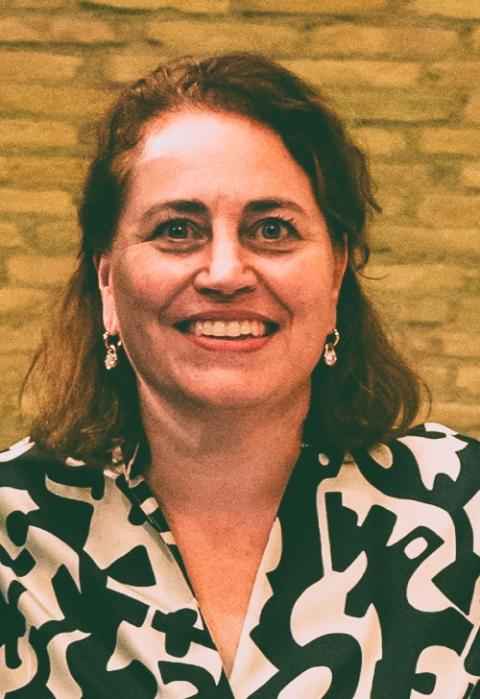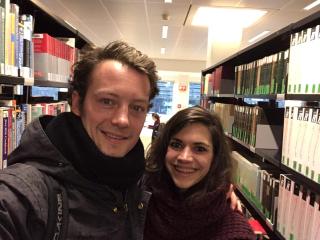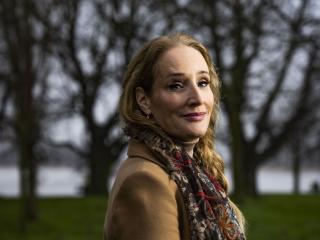Juliëtte van Deursen-Vreeburg: compassion and learning to listen with our hearts
Our society suffers from conflicts and frictions that only seem to get worse: tensions and clashes between rich and poor, between people with different backgrounds and beliefs, between prosperous countries and the global south, in heated debates about who will pay for the effects of climate change, and in conflict areas such as Ukraine and Israel-Gaza. Do we see each other less as fellow human beings and more as enemies? Are we still capable of opening up to others? Muster empathy? An interview with historian and theologian Dr. Juliëtte van Deursen-Vreeburg, who believes education can play a vital role and whose advocacy of “more dialog, less debate” comes with an intriguing recommendation for digital detoxing.
“I do see rather a lot of hostile stereotyping these days, at schools for example, where students sympathize with far-right ideas, and teachers prefer to stay away from certain topics. Social media fuel the feeling of polarization because we do not really meet to talk; it’s like we’re trapped on social media.
But I am also a historian and I’m currently reading about the Reformation. That puts things into perspective to some extent: war and strife are of all times. That is the comfort, albeit somewhat cold at times, history has to offer. When I look at my life, it was the small, everyday things that occupied us more when I was growing up. Today, war and climate change are much closer because of the media; in zooming in on what’s going wrong, they contribute to a pessimistic world view.

It is natural to feel compassion for those close to us; it is hard to see people we know suffer. When hardship is more remote, that feeling must be sparked, by a group or a community that we can join
When the suffering and sorrow in the world are too much with us, we withdraw, and understandably so; we all have our private concerns over loved ones, money, or housing. It is natural to feel compassion for those close to us; it is hard to see people we know suffer. When hardship is more remote, that feeling must be sparked, by a group or a community that we can join. For individuals, it’s harder to sustain compassion, particularly in the long term. How can one person’s contribution ease suffering far away?
In our individualized society, people are less connected with communities than before. For example, people offer a helping hand far less often through church these days. When war broke out in Ukraine, many people were willing to help, but that willingness is fading. We do empathize with others, but less so as time passes.”
When a sensitive issue comes up, we, too, often switch to debate mode
Then how can we remain open to one another and keep the flame of compassion burning for people who find themselves in dire straits?
“Some years ago, we wrote about spiritual hospitality (Van Deursen-Vreeburg, Mock, and Poorthuis, Abraham/Ibrahim. The spirituality of hospitality (in Dutch)). What served as the starting point was the notion of hospitality that is central to the three Abrahamic religions: Judaism, Christianity, and Islam. Abraham, their common patriarch, invited three strangers into his tent as guests and offered them food. This story has made Abraham a role model for spiritual hospitality and that is a wonderful thing, not only because we open ourselves to others through hospitality, but also because our guests hold up a mirror to our own ideas and traditions. We see how others look at us and they help us to reflect on our own views and way of life. This can prompt interfaith dialog. Which is not to say we must or should change our minds, but such interaction can teach us to look at ourselves more critically. It is that openness of mind that arouses our inquisitiveness and our capacity for self-reflection.
Polarization is closer to home than we might think: when a sensitive issue comes up, we, too, often switch to debate mode. But that is not inevitable: instead, we can show interest and try to understand why others think the way they do. According to Bart Brandsma, in a polarized culture, the extremes become polar opposites, and those at the extremes will try to make others take a stance, choose, and thus inch closer towards one of the extremes. Those advocating extreme views are only interested in getting their message across and in canvassing support for their program; they do not seek to genuinely listen. Yet the key to countering polarization is to galvanize those in between into speaking out so they may stop discussions from becoming venomous and from disrupting the social fabric. We should relearn to get to know each other. Why do people think what they think? More dialog, less debate. For interfaith dialog, it is imperative that people meet in person by visiting a mosque, a synagogue, or a church. When we talk to people we meet in these places of contemplation, our perception changes. And let’s go beyond the surface. That’s when we see and understand people more clearly.”
There are limits to what we as fallible human beings can achieve; it is good to realize how vulnerable we really our and that we need each other’s protection
You follow Benedict’s spiritual rule. What has it taught you about being open to others?
‘I have affiliated myself with the Benedictine abbey of Egmond-Binnen as an oblate; I go there to pray and reflect. It is a religious order dating back to the sixth century. I am not a professed, consecrated member of the order, I don’t live in the abbey; as an oblate, I live by Benedict’s spiritual rule in everyday life, with my family and at work.
Individuals who engage in a relationship with the abbey integrate Benedictine spirituality with their daily lives. To become an oblate, candidates take part in a series of training weekends and upon completion decide whether they wish to be confirmed as oblates during a celebration at the abbey.
Listening is central to Benedict’s Rule: listen with your heart, or ‘incline the ear of your heart,’ as the Prologue so beautifully opens. That is an attitude to life: suspending our initial judgment and trying to open up completely to truly listen to the other person. This makes hospitality a major virtue; we are open to others and when a guest arrives, we welcome them as if they were Christ himself. It takes practice to learn these values and virtues. It is no coincidence that Benedict calls a monastery a prep school for life. Humility is another Benedictine virtue. It derives from Latin humilitas, which itself derives from humus, earth. This virtue is about being grounded in real life, being aware that as human beings, we are imperfect, not almighty. There are limits to what we as fallible human beings can achieve; it is good to realize how vulnerable we really our and that we need each other’s protection.”
Contemplative reading is a spiritual reading method with monastic roots that I have transposed to a contemporary model that suits a diverse and secular context
You have studied contemplative reading and while education can of course foster understanding, a recent survey shows that children have become yet weaker at reading. Does that make it even more difficult to connect?
“The reading problem is a hydra, a many-headed beast. It has many causes, like phones and the fact that children and adolescents read less (which, by the way, goes for adults, too). That’s why I take a great interest in measures to ban phones from schools. When I was doing my PhD on spiritual education (Van Deursen-Vreeburg, Vacare: From lectio divina to contemplative reading (in Dutch)), I looked at how a particular reading method, contemplative reading based on the monastic lectio divina, can help us relate to texts and draw inspiration from them. Young people were given a parable to read, engaged with it, and learned from it. I interviewed teachers about the impact of this kind of reading on their students’ personal development. This is about character, as we call it at Tilburg University. Contemplative reading is a spiritual reading method with monastic roots that I have transposed to a contemporary model that suits a diverse and secular context.
At a secondary school in Den Bosch, students have not had their phones with them in class for months now and they are very content, because they are more in touch with each other and their concentration has been better. They experience it as liberating. I think it would be a good idea for students and other adults to also do without their phones for a while: why not have a digital detox day every now and then? Reading, listening, and talking go a lot better without a phone. To read is to free up time and to concentrate. Through contemplative reading we reflect on life issues and on good and evil. Reading is also about slowing down: taking time and creating mental space to enter a different world. Watching movies and TV shows can have that effect as well, but reading goes deeper. All schools, universities included, should commit to paying more attention to reading. Students are required to read a lot, but targeted reading – summarizing key points – is too one-sided an approach. To enjoy reading and to truly learn from it requires becoming immersed in the text and absorbing it. Contemplative reading is a terrific way of entering other worlds, of opening up to other cultures, other people, and other views.”
Date of publication: 21 December 2023



